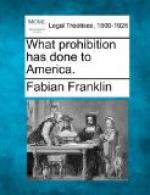Speaking in particular of the evil effects of that particular “species of criminal legislation to which sumptuary laws belong,” Mr. Carter, after dwelling upon the subject in detail, says:
An especially pernicious effect is that society becomes divided between the friends and the foes of repressive laws, and the opposing parties become animated with hostility which prevents united action for purposes considered beneficial by both. Perhaps. the worst of all is that the general regard and reverence for law are impaired, a consequence the mischief of which can scarcely be estimated (p. 247).
To prevent consequences like these, springing as they do from the most deep-seated qualities of human nature, by pious exhortations is a hopeless undertaking. But if it be so in general—if the consequences of majority tyranny in the shape of repressive laws governing personal habits could be predicted so clearly upon general principles—how vastly more certain and more serious must these consequences be when such a law is fastened upon the people by means that would be abhorrent even in the case of any ordinary law! The people who object to Prohibition are exultantly told by their masters that it is idle for them to think of throwing off their chains; that the law is riveted upon them by the Constitution, and the possibility of repeal is too remote for practical consideration. Thus the one thought that might mitigate resentment and discountenance resistance, the thought that freedom might be regained by repeal, is set aside; and the result is what we have been witnessing. On this phase of the subject, however, enough has been said in a previous chapter. What I wish to point out at present is some peculiarities of National Prohibition which make it a more than ordinarily odious example of majority tyranny. National Prohibition in the United States —granting, for the sake of argument, that it expresses the will of a majority—is not a case merely of a greater number of people forcing their standards of life upon a smaller number, in a matter in which such coercion by a majority is in its nature tyrannical. The population of the United States is, in more than one respect, composed of parts extremely diverse as regards the particular subject of this legislation. The question of drink has a totally different aspect in the South from what it has in the North; a totally different aspect in the cities from what it has in the rural districts or in small towns; to say nothing of other differences which, though important, are of less moment. How profoundly the whole course




